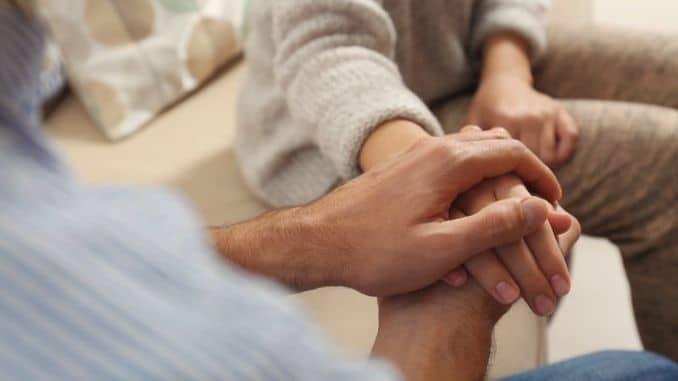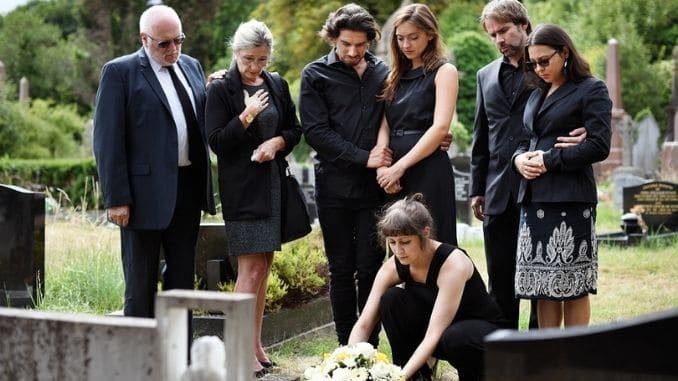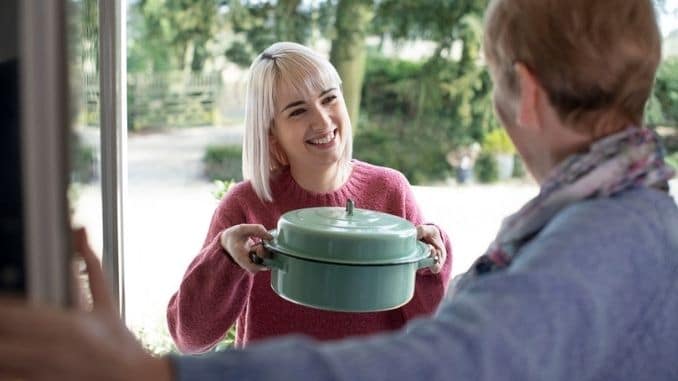
When your friend is grieving, it’s often challenging to know the most effective ways to offer support and show that you care. Sadly, it’s so difficult to figure out how to care for a grieving friend that many people stay away for fear of saying or doing something insensitive.
We spoke to a few individuals who had lost loved ones. They were able to give us some insights on how to care for the bereaved in gentle, sensitive and thoughtful ways.
Be There
Lauren Littauer Briggs, an author who has particular expertise in grief, wrote a book called, “The Art of Helping: What to Say and Do When Someone Is Hurting.” Briggs, who watched her two brothers die of brain damage, lost her own unborn child and cared for her sick, elderly family members in her own home, wrote, “One of the hardest parts of reaching out is the first contact. We are nervous about what we’ll say and how we’ll be received. We, ourselves, feel sad, burdened and scared with the news. So, we’re not sure that we’ll have anything to offer.”
Even though it may seem extremely uncomfortable, don’t avoid your grieving friend. Rachel Otiato unexpectedly became a widow in her late 20s. She had a young daughter at the time. She told us that it meant the world to her when people came to visit after her husband died. Otiato shared, “It was probably awkward for people to watch me cry, but their presence was so valuable. I will never forget it.”
Take Your Friend a Meal
When a person is grieving, the act of grocery shopping, cooking and eating can seem unimportant or overwhelming. Bereaved individuals might also not be ready to go out to eat meals in public right away.
Make a meal or buy one from a restaurant and drop it by the house. Don’t expect to be invited inside or entertained. Call ahead and arrange the drop off around dinnertime. Even picking up a rotisserie chicken and a container of premade soup from the supermarket could be helpful. Make sure to include enough food for everyone in the household and do your best to anticipate dietary preferences.
Miliana Penny, a work-at-home mom from Dearborn, Michigan, shared some insights with us about losing her husband when two of her children were very young. Penny said, “Meals were very helpful, especially because I had little kids.”
Don’t Compare the Loss of a Person With the Loss of a Pet
If you’ve never lost a close friend or family member, it can be difficult to relate with a person who’s grieving. Let me assure you that the pain of losing your child, spouse or best friend is nothing like losing your beloved cat, dog, goldfish or ferret.
Never tell someone who’s grieving the loss of a loved one that you know how it feels because you’ve experienced the loss of a chihuahua. It’s best not to bring up any comparative measures of grief.
Take Care of Issues In and Out of the Home
One of the best things you can do to help a grieving friend is to lend a hand with the essentials. The lawn will still need to be mowed, the dishes will still need to be done and the laundry will continue to pile up around the bereaved even though his or her world has seemingly come to a stop.
Penny shared, “One time, [after my husband passed away] a couple of friends came over with their kids and did some of my laundry. It was very practical, and I remember being floored by that.” Find an essential task and take care of it for the bereaved. It will be immensely appreciated.
Respect Your Friend’s Wishes
Mark Grindle, of Madison, Wisconsin, told us that when his father passed away, he wanted to be left alone. Grindle, age 45, said that it was awkward when people kept asking him how he was doing. It was as if they expected him to fall apart when he was OK and wanted to keep to himself about the loss.
If your grieving friend wants to process the pain on his or her own time and be treated normally, respect those wishes and don’t keep pushing. Check in from time to time, but keep the conversation light, rather than digging deep into feelings and emotions.
Don’t Take Anything Personally
My closest childhood friend was pregnant and delivered a stillborn child. When her husband called to tell me what had happened, he said that they were planning a funeral for the child. However, he also told me gently that my friend didn’t want to talk to me or anyone else about it yet and did not want anyone but their parents at the funeral with them.
That was hard to take. Of course, I wanted to sprint out of my house and drive to the hospital to comfort her. It was me ― her best friend from the sixth grade. Of course, she needed me by her side. However, I had to realize that she was struggling and grieving, and she and her immediate family needed time and space to heal.
While you may feel offended or slighted when your grieving loved one specifically asks you not to come around for a few days, don’t take it personally. At some point, your friend will be ready to accept your comfort and companionship ― particularly if you graciously and respectfully comply with the initial request for privacy.
Offer to Make Difficult Phone Calls
It’s difficult for the bereaved to call all of his or her friends and family members to inform them of the death. Offer to make calls for your friend so that he or she doesn’t have to repeat the same harrowing news three dozen times during such an already difficult time.
Show Up to the Funeral
Unless it is a private, family-only service, show up at the funeral to support your friend.
Be There After the Funeral
Otiato said, “The day Charles died, many people called, but I was in no condition to talk. I needed the calls after the funeral. For most people, the funeral gives them closure. But when it’s your spouse, that’s when the real grief begins. It’s called secondary grief. Not only did I lose my husband, but I also lost his income, the help with our daughter and chores, my assembler and handyman.”
After all the flowers have begun to wilt and the last loaf of Aunt Shirley’s famous banana nut bread has been eaten, the bereaved will still need support. Be there 30 days after the funeral when the majority of well-wishers have dwindled. Bring over a meal, send another care package, offer to help with the children or schedule a time to have coffee with your still-grieving friend.
Offer to Sleep Over
When someone has lost a close family member, the home can seem quiet and lonely. The first few nights are especially difficult. Penny told us that it was helpful to have her husband’s mother and his best friend staying with her and the kids at their house after her husband died.
Honor the Memories
Don’t be afraid to talk about the person who has passed away. Often, people are nervous about bringing up the name of the deceased person. Your friend, who has lost a loved one, doesn’t want to lose the memories of that person as well. Spend time with your friend sharing fond memories about the person who passed away. Likely, you’ll both laugh and cry together. However, these sweet recollections are so precious to the bereaved soul.
Don’t Try to Hold It All Together
Being strong for a friend who has lost a loved one is overrated. Don’t put on a show in front of your grieving friend. If you’re sad too, it’s OK to cry. It’s also OK to cry because your friend is crying, and you care for him or her. No one wants you to come over and tiptoe around, pretending not to have emotions.
Avoid Insensitive Phrases and Clichés
It’s better to sit quietly and say nothing at all than to say something insensitive to a person experiencing grief and loss. Here’s an abbreviated list of things to avoid saying to your grieving friend:
- He (or she) is in a better place now
- God works in mysterious ways
- How are you doing?
- Things could be worse
- God will never give you more than you can handle
- You can always have another child
- It was her (or his) time to go
- Anything that starts with the words “at least”
While you may have every intention of comforting your friend with comments like the ones we’ve listed above, this kind of communication can diminish your friend’s feelings. These comments could also make it seem like you don’t understand the heaviness of the tragic loss that has occurred.
Be Insistent About Helping
Often, those who are grieving will not ask you for help. Nonetheless, they are likely very much in need of assistance. Briggs wrote, “Go to them. Your presence is far more important than your words. Be aggressive with your willingness to help. Ask yourself, ‘What would I need if I were in a similar situation?’”
Here are some specific things you can say to offer your help:
- We would love to have your kids over for a movie night this week. What day is best?
- I have the day off tomorrow, and I’m planning to come and mow your lawn. Would you prefer I come in the morning or afternoon?
- I’m here at the market. What kinds of produce do you need? Will your family eat wheat or white bread?
- I’d like to bring you some takeout food tonight. What’s your favorite entrée from that Thai place that you like?
Briggs added, “Don’t leave the ball in their court. Most of the time, people in a crisis can’t decide or don’t know what they do need and would never dream of asking because they do not want to impose.” Be specific and insist on helping when you know your friend truly needs a hand.
Offer to Do the Heartbreaking Things Together
There are things that folks never dream of having to do. Some of those things include choosing a casket for a child, signing a death certificate for a spouse or planning details of a memorial service for a family member. Penny said, “Bill’s best friend was the most helpful in setting up the memorial service. I wouldn’t have been able to do it alone.”
It’s heartbreaking to have to pick up the pieces and push through with necessary final procedures and preparations. Offer to go along with your friend to complete the unthinkable tasks that have to be done in the event of a loved one’s death.
Don’t expect certain behaviors after a prescribed amount of time. Never ask a widower when he plans to stop wearing his wedding ring or expect a grieving mother to be back to her old self within a certain amount of time. It’s not up to us to decide when someone is ready to move on or give up memorializing his lost loved one.
Remember to Invite Them
How to Care for a Grieving Friend: Many bereaved folks report that they stopped being invited to general social events after their losses. Otiato recalled, “All invites [to social events and birthday parties] stopped. So, I felt excluded and alone.”
It’s important to continue to invite your grieving friends to all the events you would have normally asked them to attend. Give them the option to decline, instead of the disappointment to find that they were never invited at all.
Include Them During the Holidays
How to Care for a Grieving Friend: Holidays are particularly difficult for those suffering from grief. Fortunately, a friend of Otiato’s did reach out to invite her and her daughter over to enjoy Thanksgiving dinner. Otiato said, “Charles died on November 4. We got an invitation to Thanksgiving dinner, which meant the world to me. If we didn’t get invited, we would have been sitting at home for the holiday.” Otiato told us that invitations like that were the most heartwarming gestures for her.
Similarly, Penny said that her church group surprised her by “adopting” her and the kids during their first Christmas without her husband.
Look for Support Groups
How to Care for a Grieving Friend: Penny told us that she had attended some general counseling sessions after her husband passed, but that a grief support group would have been beneficial to her.
When a person is hurting and grieving the loss of a loved one, they need to be able to relate with others who have been in similar situations. Find a grief support group in your friend’s area and recommend it. Offer to go along to the first meeting if that would help.
Care for Your Grieving Friend
Even after reading this advice, you may still feel ill-equipped to step in and care for your bereaved friend. That’s normal. Struggle through the feelings of discomfort and awkwardness to be there and offer your support. It can make all the difference in the world to a person experiencing grief and loss.
For your guide to the best foods to heal your body, check out The Best Foods that Rapidly Slim & Heal Your Body in 7 Days, here!











